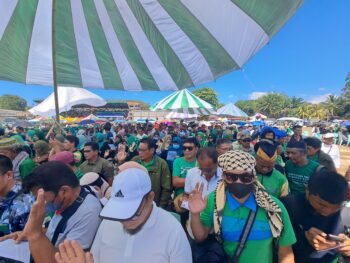KORONADAL CITY (MindaNews/28 May) — Turning Mindanao into an “oil palm hub” poses a threat to the coconut industry, a research institution said in a statement Monday.
The Davao City-based Alternate Forum for Research in Mindanao (AFRIM) cited a plan to convert thousands of hectares of lands into oil palm plantations, mostly in the Autonomous Region of Muslim Mindanao (ARMM) and the Caraga region.
AFRIM cautioned that the plan threatens the coconut industry, one of the island’s major sources of export revenues and on which the country’s three million coconut farmers, majority of whom are in Mindanao rely.
“AFRIM expresses apprehension on the targeted thousands of hectares of lands to be planted with oil palm [in Mindanao], the Davao City-based think tank said in a statement.
On May 21, the Mindanao Development Authority (MinDA) revealed that out of the almost 900,000 hectares of land identified to be suitable for oil palm plantation, 177,000 hectares of it are already under negotiation for palm oil development.
“This calls for a better and stronger participation of our private sector, and more facilitative policies and programs from the government’s end,” said MinDA chair Luwalhati Antonino.
Under MinDA’s investment program, various business-matching sessions were conducted with potential palm oil investors, in partnership with the Board of Investments (BOI) and the Department of Trade and Industry (DTI), which may translate into actual investment projects in a span of two years.
“Several international players in the palm oil industry are actually very interested in the vast lands that Mindanao has to offer, we just have to continue facilitating the actual implementation of these investments,” said Antonino.
AFRIM cited that “in a parallel move, businessman Manuel Pangilinan of First Pacific Oil Co. Ltd. is considering developing 30,000 hectares of land in Davao Oriental for oil palm production and processing.”
Davao Oriental, which suffered Typhoon Pablo’s wrath in December 2012, especially the east coast where majority of coconut farmers are, has been the top producer of coconut for years, producing 1,046,224 metric tons last 2011, it added.
Instead of making a new investment plan, AFRIM urged the government to shift its focus on maximizing the potential of the existing coconut industry in the island.
Providing adequate support to coconut farmers (i.e. capacity building on planting food crops, product value adding) that they will not rely solely on copra will result to increased income for the benefit of small farmers. Also, recent figures show that the global demand for coconut oil, although fluctuating at times, overall has remained constant. In the case of the Philippines, however, coconut production has been decreasing for the past five years, AFRIM said.
Citing its years of research on Mindanao’s oil palm industry, the group stressed that aside from adverse environmental impacts (i.e. loss of biodiversity, changes in land, forest and water resources), social problems and conflicts can arise within and among communities, especially in ancestral domains, between investors and small farmers “due to onerous contracts that can result to massive debts and land dispossession on the part of the farmers.”
“Farmers are usually enticed to the short-term financial returns offered by big plantation companies due to limited income sources and economic opportunities in the rural areas,” AFRIM said.
It also said that that the coconut industry has long been neglected in terms of support services, budget allocation and policy support to revitalize this so-called “sunset industry.”
“Diversification of coconut products and not solely relying on coconut oil for exports can maximize its market potential,” AFRIM said.
“At the community level, AFRIM knows that this is possible since its coconut-producing partner people’s organization in Davao Oriental has already started to produce energy drink and wine from coconut,” it added.
AFRIM said that while it welcomes investments to Mindanao’s poor provinces, the government should “bring out the best of the coconut industry.”
It added the Pablo-devastated coconut provinces should not be converted into oil palm plantations but replanted with new coconut trees and provided seedlings for inter-cropping to revive Mindanao’s coconut industry. (MindaNews)
